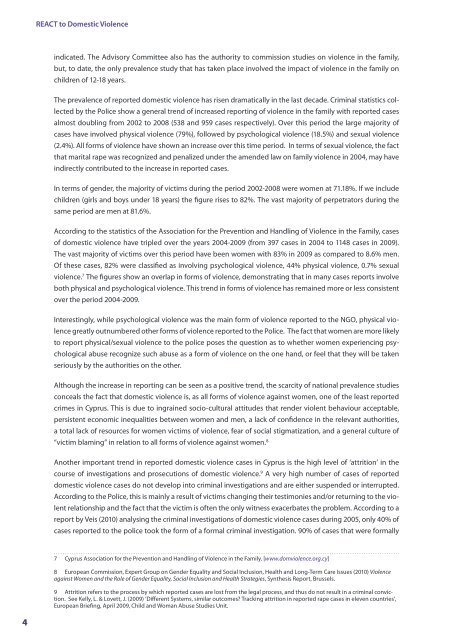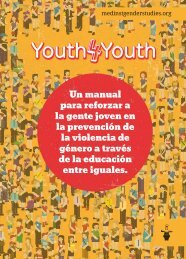react to domestic violence
react to domestic violence
react to domestic violence
Create successful ePaper yourself
Turn your PDF publications into a flip-book with our unique Google optimized e-Paper software.
REACT <strong>to</strong> Domestic Violence<br />
indicated. The Advisory Committee also has the authority <strong>to</strong> commission studies on <strong>violence</strong> in the family,<br />
but, <strong>to</strong> date, the only prevalence study that has taken place involved the impact of <strong>violence</strong> in the family on<br />
children of 12-18 years.<br />
The prevalence of reported <strong>domestic</strong> <strong>violence</strong> has risen dramatically in the last decade. Criminal statistics collected<br />
by the Police show a general trend of increased reporting of <strong>violence</strong> in the family with reported cases<br />
almost doubling from 2002 <strong>to</strong> 2008 (538 and 959 cases respectively). Over this period the large majority of<br />
cases have involved physical <strong>violence</strong> (79%), followed by psychological <strong>violence</strong> (18.5%) and sexual <strong>violence</strong><br />
(2.4%). All forms of <strong>violence</strong> have shown an increase over this time period. In terms of sexual <strong>violence</strong>, the fact<br />
that marital rape was recognized and penalized under the amended law on family <strong>violence</strong> in 2004, may have<br />
indirectly contributed <strong>to</strong> the increase in reported cases.<br />
In terms of gender, the majority of victims during the period 2002-2008 were women at 71.18%. If we include<br />
children (girls and boys under 18 years) the figure rises <strong>to</strong> 82%. The vast majority of perpetra<strong>to</strong>rs during the<br />
same period are men at 81.6%.<br />
According <strong>to</strong> the statistics of the Association for the Prevention and Handling of Violence in the Family, cases<br />
of <strong>domestic</strong> <strong>violence</strong> have tripled over the years 2004-2009 (from 397 cases in 2004 <strong>to</strong> 1148 cases in 2009).<br />
The vast majority of victims over this period have been women with 83% in 2009 as compared <strong>to</strong> 8.6% men.<br />
Of these cases, 82% were classified as involving psychological <strong>violence</strong>, 44% physical <strong>violence</strong>, 0.7% sexual<br />
<strong>violence</strong>. 7 The figures show an overlap in forms of <strong>violence</strong>, demonstrating that in many cases reports involve<br />
both physical and psychological <strong>violence</strong>. This trend in forms of <strong>violence</strong> has remained more or less consistent<br />
over the period 2004-2009.<br />
Interestingly, while psychological <strong>violence</strong> was the main form of <strong>violence</strong> reported <strong>to</strong> the NGO, physical <strong>violence</strong><br />
greatly outnumbered other forms of <strong>violence</strong> reported <strong>to</strong> the Police. The fact that women are more likely<br />
<strong>to</strong> report physical/sexual <strong>violence</strong> <strong>to</strong> the police poses the question as <strong>to</strong> whether women experiencing psychological<br />
abuse recognize such abuse as a form of <strong>violence</strong> on the one hand, or feel that they will be taken<br />
seriously by the authorities on the other.<br />
Although the increase in reporting can be seen as a positive trend, the scarcity of national prevalence studies<br />
conceals the fact that <strong>domestic</strong> <strong>violence</strong> is, as all forms of <strong>violence</strong> against women, one of the least reported<br />
crimes in Cyprus. This is due <strong>to</strong> ingrained socio-cultural attitudes that render violent behaviour acceptable,<br />
persistent economic inequalities between women and men, a lack of confidence in the relevant authorities,<br />
a <strong>to</strong>tal lack of resources for women victims of <strong>violence</strong>, fear of social stigmatization, and a general culture of<br />
“victim blaming” in relation <strong>to</strong> all forms of <strong>violence</strong> against women. 8<br />
Another important trend in reported <strong>domestic</strong> <strong>violence</strong> cases in Cyprus is the high level of ‘attrition’ in the<br />
course of investigations and prosecutions of <strong>domestic</strong> <strong>violence</strong>. 9 A very high number of cases of reported<br />
<strong>domestic</strong> <strong>violence</strong> cases do not develop in<strong>to</strong> criminal investigations and are either suspended or interrupted.<br />
According <strong>to</strong> the Police, this is mainly a result of victims changing their testimonies and/or returning <strong>to</strong> the violent<br />
relationship and the fact that the victim is often the only witness exacerbates the problem. According <strong>to</strong> a<br />
report by Veis (2010) analysing the criminal investigations of <strong>domestic</strong> <strong>violence</strong> cases during 2005, only 40% of<br />
cases reported <strong>to</strong> the police <strong>to</strong>ok the form of a formal criminal investigation. 90% of cases that were formally<br />
7 Cyprus Association for the Prevention and Handling of Violence in the Family. [www.dom<strong>violence</strong>.org.cy]<br />
8 European Commission, Expert Group on Gender Equality and Social Inclusion, Health and Long-Term Care Issues (2010) Violence<br />
against Women and the Role of Gender Equality, Social Inclusion and Health Strategies, Synthesis Report, Brussels.<br />
9 Attrition refers <strong>to</strong> the process by which reported cases are lost from the legal process, and thus do not result in a criminal conviction.<br />
See Kelly, L. & Lovett, J. (2009) ‘Different Systems, similar outcomes? Tracking attrition in reported rape cases in eleven countries’,<br />
European Briefing, April 2009, Child and Woman Abuse Studies Unit.<br />
4







